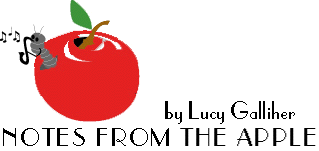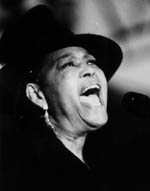

I had a chance to interview Abbey Lincoln one Sunday afternoon in September 2001. We had lunch together at Henry's, a restaurant on the Upper West Side that is on the premises of the old Birdland. I asked her about a number of different subjects, and the following narration is in her own words:
"It's hard to be somebody and market yourself. I never knew I was going to have a career. You don't tell the Gods what to do; they'll let you know. If you're not marketed, it has nothing to do with how talented you are. This is an industry; it's made from the Arts.
Coming from my mother and father, he built the
house I grew up in. Mama made our clothes, and the girls learned how to
make their clothes. I'm one of twelth. I didn't grow up in the ghetto or
a slum. I lived under the hill. The school was up on the hill, and the wealthy
children lived there. The people who worked for the (rich) families also
went to the school. We were in the suburbs of Chicago, and in Michigan on
a farm. Laying on the ground watching the clouds roll by. Nowadays, I really
love New York. It's my favorite city. 
I never was up-and-coming, I always "was." I learned it from my mother and father, that I was somebody. I had a chance to sing in school, grammar school and high school, sang in church sometimes, and somebody always came to get me, made it easy for me. I lived with my auntie near a man who had a liquor store, Steve (in Watts, L.A.). Watts was a beautiful neighborhood then. He took a fancy to me and gave me an agent's name. This agent booked unusual combinations: piano, no bass, female drummer, and I was the singer.
They call it Jazz. The country doesn't understand the music or its importance. That's why they call it Jazz. And then they'll say, "I don't want to hear all that Jazz." It's a four-letter, derogatory term, but there's a part of me that would rather have it like this. Because when you become popular and everybody knows your name, you have just lost your music. No more music comes. You're so busy living it up and being a star. I think it's hard for an artist to live in that setting.
I made a movie called "The Love of Ivy" with Sidney Poitier. And those who were watching from a distance thought I wanted to make another movie, but I didn't. My first album was with Benny Carter, and my manager (Bob Russell) named me Abbey Lincoln. They made me feel like a beautiful woman.
But I've always been opinionated. I don't live here and agree, like a sheep. I don't see myself as a lamb. I am a lion. And I have to have some input in what goes for my life. That gets on a lot of peoples' nerves. You're supposed to be a lackey and do what the promoters say. I don't give a damn about money. But if it weren't for those people that produce the music, we wouldn't have careers.
The musicians have suffered, financially and prestige-wise, and they are not prepared for the business. They know how to play their instruments, but they don't know where they are, as far as the industry is concerned. If you don't worship the god of money, you create enemies, because it frightens them. They want everybody to be doing what they're doing; it's not enough for the whole crowd to be going that way. They don't want any stragglers. They feel threatened and want to discourage you. But this work is all about the healing spirit, and how you see things, a way of looking at something.
Beethoven, and (his contemporaries) were subsidized by the government and the church. If you have something that is serious and good, then the government should promote it so the people will have something. We don't have patrons. If you can make music, you have to know how to produce it. A lot of people don't like this form (Jazz), because they can't handle it. You have to be able to think (the audience as well as the performer). It's spiritual and intellectual music.
I'm tired of seeing the kids get ripped off. They never make any money. They're gullible and naïve. For a man, it's critical. He's supposed to be the breadwinner. His self-respect is on the line. The women work, bring babies, support them, it doesn't help his spirit.
It outrages me to hear women (musicians), who call themselves feminists, complain about the music, and how the men held them back. Nobody tells these people if they can play or not. Do what he does: stand there and play like Charlie Parker, be a Duke Ellington.
We've had a bunch of brilliant women on the stage:
Hazel Scott, the Sweethearts of Rhythm, Dinah Washington, Sarah Vaughan,
Billie Holiday. If you're female and you've got that magic, people will
swim the ocean to come to see you. If you're lucky enough to be on the stage
with them, they'll give you pointers and tell you things. Sarah and the
others were not my peers- we were in different realms. They were like my
older sisters; we respected and loved one another.
I wrote a lyric to Thelonious Monk's "Blue Monk." (Max) Roach
called Monk and asked him to come to the recording session to say whether
I could use it or not. He encouraged me, whispered in my ear, "Don't
be so perfect." I learned a lot from the musicians and singers. He
didn't try to run up and down the piano and show how agile he was. He played
the damn song. There wasn't a lie in him anywhere. They worshipped him because
he withstood everything and persevered. They put him on the cover of Time
Magazine.
The only person I had a relationship with was Max
Roach. When I told him what Monk had said, he said, "He means, 'make
a mistake.'" You reach for something. If your voice cracks, if you
hear it, reach for it. That's what this music is. I learned a lot from Max
Roach about life. He is brilliant. He understood the structure of the country,
went to university, and was privileged to be in the presence of Charlie
Parker. He told me that Parker was great. He introduced me to a lot of things.
The music is great. The musicians are not half as great as the music. (I
wish) we would all transcend it. Some of them are lazy. But if you play
the fool, you can't expect that people are not going to treat you like one.
There's plenty of money in Jazz. It's a treasure chest after awhile, whether you're alive or dead. Billie Holliday is a rich woman. Most of the wealth I have is in the songs I wrote. I have more than 60 songs published.
(On the other hand), The man who wrote "Lover Man," Ram Ramirez, sold his copyright for $50 to somebody. That man made a pile of money on Ram. There's no excuse for that: it's a lack of self-respect. More than music, we have to study being spiritual beings. If you have a feeling for life and have any self-respect, how could you stick a needle in your arm? Being a whore is not respectable. Well, a lot of musicians practice this street life. They're afraid to be above reproach and wise. And that's what the music is- if you don't have wisdom, you will die here.
My current musicians are brilliant, like their predecessors. I got my piano player, Brandon McCune, from Betty Carter's manager. She said he's expressive and loose, and it's true, he's marvelous. The drummer, Jaz Sawyer, is twenty-three. This young man has nothing to worry about. The bass player, Jon Ormond, is brilliant.
We need to be more tolerant of one another. We have made mistakes. All of us have scars and wounds to show from living on the planet. We were here without a lot of information, and were told a lot of lies: Santa Claus, a Virgin Birth, and the Easter Bunny. This is what we were given. I hope the WTC bombing has opened up peoples' eyes. We need to confront each other."
Transcribed by Lucy Galliher
Back to ![]() Contents Page
Contents Page
Jazz Now Interactive
Copyright Jazz Now, November 2001 issue, all rights reserved
jazzinfo@jazznow.com